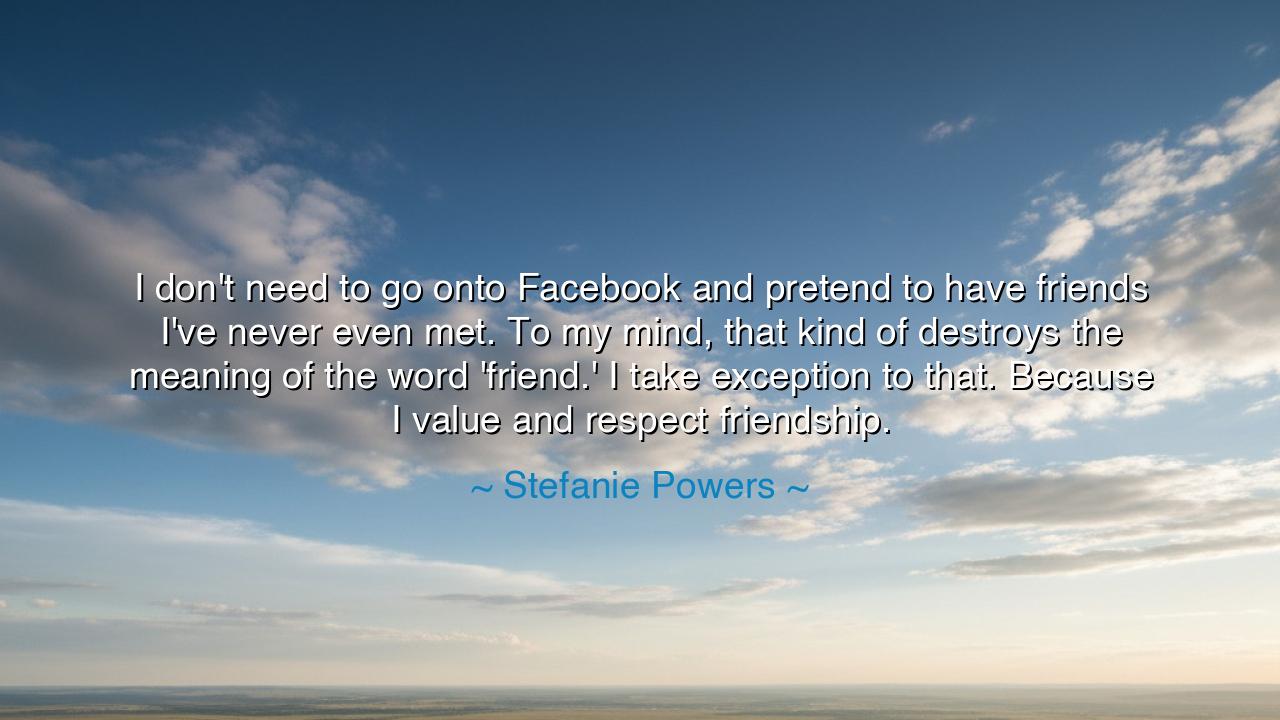
I don't need to go onto Facebook and pretend to have friends I've
I don't need to go onto Facebook and pretend to have friends I've never even met. To my mind, that kind of destroys the meaning of the word 'friend.' I take exception to that. Because I value and respect friendship.






“I don’t need to go onto Facebook and pretend to have friends I’ve never even met. To my mind, that kind of destroys the meaning of the word ‘friend.’ I take exception to that. Because I value and respect friendship.” Thus spoke Stefanie Powers, a woman of grace and reflection, whose words cut through the noise of a modern age consumed by appearances and illusion. In this statement, she calls us back to an ancient truth long forgotten in the age of screens: that friendship is sacred, that it is not measured in numbers or names, but in loyalty, presence, and shared understanding. Hers is not merely a critique of technology—it is a defense of authentic connection, the kind that nourishes the soul and binds human hearts across time.
The origin of this saying lies in Powers’ deep awareness of what it means to be human in a digital era that often mistakes contact for connection. Having lived a life rich with experience, she stands as witness to the transformation of the word “friend” from something living and sacred to something fleeting and hollow. Once, friendship meant shared trials, mutual trust, and the intertwining of destinies; now, it is too often reduced to a click, a symbol, an image. In speaking out, Powers joins the long line of philosophers and poets who warned that words lose their meaning when stripped of their spirit. She takes exception, not because she despises change, but because she honors truth.
In her view, to call someone a friend is to acknowledge a bond forged through sincerity, not convenience. True friendship is not born of algorithms or shared timelines; it arises from shared experience, from the laughter and silence that pass between two souls who understand one another. It cannot exist in pretense, for it demands the courage to be known and the patience to know. The digital world may multiply acquaintances, but it cannot multiply intimacy. Powers’ words, therefore, are not nostalgia—they are a summons to remember what friendship truly requires: time, trust, and tenderness.
Consider the story of Helen Keller and Anne Sullivan, one of history’s most radiant examples of friendship. Helen, blind and deaf from childhood, lived in darkness until Anne entered her life. Through persistence and love, Anne taught Helen to communicate, opening her mind and heart to the world. Their bond was not built upon convenience or flattery but upon shared struggle and unwavering faith in one another. For decades, they walked side by side, not as teacher and pupil, but as friends—each giving the other the gift of understanding. That is the kind of friendship Stefanie Powers honors: one that is lived, not displayed; one that endures, not one that fades with a loss of signal or screen.
The meaning of her words also reaches deeper into the nature of modern loneliness. We live in an age where many know thousands of names, yet few are truly known. We share photographs but not presence, opinions but not compassion. In seeking to appear connected, we have forgotten how to be connected. Powers reminds us that friendship is not about visibility—it is about vulnerability. To respect friendship is to treat it as sacred work, requiring honesty, patience, and the willingness to stand beside another through both joy and sorrow.
Her statement carries a quiet warning: that when we cheapen the language of friendship, we cheapen the emotion itself. To call every stranger a friend is to strip the word of its power, just as to proclaim love too lightly is to empty it of its depth. A friend is not a follower; a friend is one who stands by you when the world forgets you. In an age obsessed with public approval, friendship remains a private act of devotion—one that does not seek attention, only authenticity.
Let this, then, be the lesson of Stefanie Powers’ wisdom: guard your friendships as treasures, not trophies. Choose your companions with discernment, and honor them with presence rather than posts. Meet face to face, listen deeply, forgive quickly. Do not measure friendship by proximity or popularity, but by truthfulness. Be the kind of friend who shows up in silence, who remembers without reminders, who values the bond more than the benefit.
For in the end, the digital world may connect our devices, but only the heart connects our souls. Powers’ words are a reminder to return to what is real—to seek not the illusion of many, but the truth of the few. For the meaning of friendship has never changed, only our memory of it has. To value and respect friendship, as she does, is to honor the oldest covenant of humanity: that we are not meant to walk alone, and that to truly be a friend—to one or to few—is to live with depth, integrity, and love that cannot be measured by the world’s devices.






AAdministratorAdministrator
Welcome, honored guests. Please leave a comment, we will respond soon